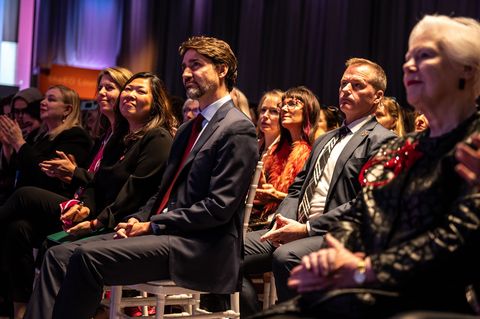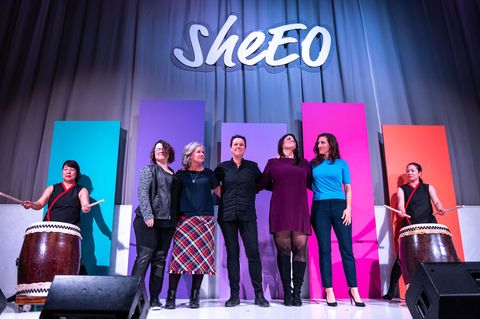On March 12th, Hannah Cree was flying high—literally and figuratively. She was on a plane back home to Calgary, in Alberta, Canada, after attending a conference in Toronto. There, she had participated in a presentation in front of 800 people—including Canadian Prime Minister Justin Trudeau—at The Global Summit hosted by the SheEO network of investors. The all-female group funds woman-run businesses that are tackling the “World’s To-Do List,” the United Nations’ sustainable development goals, which range from fighting poverty to cleaning up the environment.
At the summit, Cree spoke about her plans to expand her company, CMNGD Linens (pronounced “Common Good”), which hires employees who are overcoming homelessness to pick up, launder, and deliver linens to restaurants. The organization provides jobs for people who would otherwise have a hard time getting hired, and it had been rapidly expanding since its launch in 2016.
Three days after her flight landed, however, Calgary instituted a State of Emergency, shuttering non-essential businesses in an effort to stop the quickly spreading coronavirus. Suddenly, “we had call after call from our clients saying they were closing down,” says Cree. Some of the restaurants were staying open for delivery through the pandemic—but they didn’t need linens laundered. Just a few days after her triumph in Toronto, it looked like instead of expanding, her business would be closing. Cree says: “We went from receiving checks in the mail every day to losing all of our customers in 36 hours.”
Exactly one week after attending the Global Summit, Cree joined an emergency “all-call,” a global zoom meeting of SheEO investors and the owners of the companies they finance to discuss how the pandemic was impacting them. Forty women from four countries joined for a check-in led by SheEO founder Vicki Saunders, who describes the call as, “a very quick business analysis of whether you are green, yellow, red— are you doing ok, cautiously worried, or at deep risk?”
Cree was crimson. “I was in tears,” she recalls. “Asking, ‘How do I lay people off who are living in a homeless shelter?’” She wasn’t alone in her concern. In fact, adds Saunders, “The number one thing people on the call were worried about was, ‘How do we not lose any jobs in our community?’”
Jumping in to help, some of the entrepreneurs on the call asked Cree to identify what assets CMNGD had. “We have trucks that are now off the road and drivers who could be unemployed if we don’t figure this out,” she said. “And all these restaurants that are closing down with all this food.” Looking at the situation, Cree says, “I realized we could redeploy, helping other nonprofits deliver food to people who need it, or delivering large shipments to the nonprofits.”
Along with hope came help. On that same call, the CEO of Alinker, a SheEO-supported venture which produces a walking bike for people with mobility issues, asked Cree what the minimum amount was that she needed to make her March payroll. As Cree tells it, “Then she said, ‘I will put that in your bank.’”
Since that call, Saunders says, “There are dozens of examples where this happened. Within 24 hours, women in the network were loaning each other money, resourcing how to crowdfund ways for them not to have to lay off their staff, supporting each other online and becoming each other’s customers.”
SheEO has always had a philosophy of “radical generosity,” in which investors give zero percent loans, funding ventures they believe in out of a desire to make change, rather than just make a profit—but this crisis is bringing the community together in new ways. There’s now a weekly call scheduled so that the women can support each other financially and emotionally. And the radical generosity is spreading; Cree has replicated SheEO’s model within her own community in Calgary, starting a twice-weekly call for local businesses and a Slack Channel of “Asks” and “Gives” where people can share resources posting what they need or what they can offer.
Beyond the SheEO network, Saunders believes that “collaborating, not competing” is the only way businesses can survive the pandemic—especially since small businesses make up 90 percent of the U.S. economy. “We’ve got this totally individualistic society, it’s all about me, but when people are in relationships, the whole thing changes,” she says. “The tighter the community relationships, the more likely they’re going to be resilient and survive this.”
As far as Cree is concerned, the increased community mindset isn’t just a smart strategy for surviving the economic devastation caused by the pandemic, but a potential silver lining. After all, she says, “Now is the opportunity where we can all look at community and collaboration and jump in and give of our greatest resources.”
For more ways to live your best life plus all things Oprah, sign up for our newsletter!







